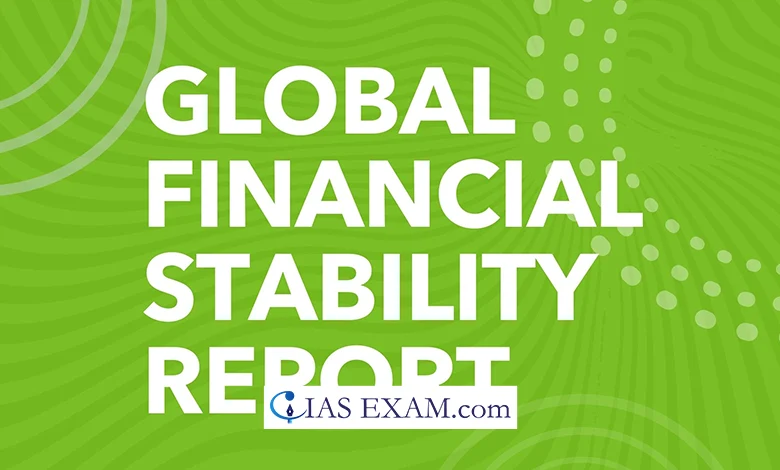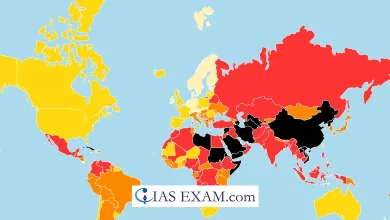
Context
The International Monetary Fund (IMF) recently released its global financial stability report, sounding alarms about several key risks to the stability of the global financial system.
Key Points of the Report
- Persistent Inflation: IMF warns to avoid early optimism about ending high inflation which continue to be underpinned by the various pressures as well as geopolitical risks.
- Market Implications: Investor’s faith in the central bank easing policy has fetched additional gains such as appreciation of asset prices. However, market corrections are expected in the event that inflation remains high, therefore, capital outflows are likely from emerging economies like India.
- Unregulated Credit Market: The speedy growth of the shadowy private market of credit which is unregulated raises a few doubts about the financial stability, if not rightly monitored and managed corporate credit lending might lead to bad times.
- India’s Private Credit: The fact that India’s alternative investment funds (AIFs) grow the private credit market in terms of volume, also necessarily entails hard line regulatory rules being applied by such institutions as RBI and SEBI.
- Cybersecurity Risks: Financial organisations are often a target for cyber attacks, which can lead to compromised information and financial loss.
- India’s Response: Indian financial institutions are working towards cybersecurity by collaboration and funding the CSS technologies.
Inflationary Pressures and Investor Optimism
- IMF’s Warning on Inflation:
-
-
- The IMF warns of unrealistic and optimistic expectations on the part of investors concerning the end of high inflation, pointing at the fact that while most major economies of the world indeed face inflationary pressures; it is not expected to be over shortly.
- Geopolitical risks which have been created by protracted wars in West Asia and Ukraine pose additional factors through which they affect the price stability and lead to central bank’s delay in interest rate increase.
-
- Implications for Global Markets:
- As investors enthusiastically expect central bank rate cuts, the asset values skyrocket. However, the IMF points out that the markets can be corrected significantly if inflation persists.
- A further uncertainty may persuade investors to take away funds from emerging market countries like India, which may lead to currency depreciation consequently slowing down the country’s economy.
Risks in the Unregulated Credit Market
- Growing Concerns in Private Credit:
-
-
- The IMF also gives the attention to the fact that the private credit market has developed uncontrolled and it has reached 2,1 trillion dollars globally as non-bank financial institutions are not stopping to provide credit to corporate clients.
- The lack of transparency and financial accountability erodes the confidence of the markets on the sustainability of the debtors and the stability of the whole financial system.
-
- India’s Experience with Private Credit:
- As investors enthusiastically expect central bank rate cuts, the asset values skyrocket. However, the IMF points out that the markets can be corrected significantly if inflation persists.
- A further uncertainty may persuade investors to take away funds from emerging market countries like India, which may lead to currency depreciation consequently slowing down the country’s economy.
Heightened Cybersecurity Threats
- Vulnerabilities in Financial Institutions:
-
-
- The IMF highlights the increasing frequency and sophistication of cyber-attacks targeting financial institutions worldwide.
- Vulnerabilities in cybersecurity infrastructure pose significant risks to financial stability, potentially leading to data breaches, financial fraud, and disruptions in market operations.
-
- India’s Response to Cyber Threats:
- The Indian financial service organisations inclusively start considering the cyber space to be important along with that they also do to strengthen their cyber securities.
- In order to monitor the cyber danger with all its consequences, it will be necessary to develop a partnership between private and public sector and use of the newest cybersecurity technologies – these are the main factors that will help cyber security as soon as possible.
Impact on India
- In 2023, India which receives a sufficient amount of foreign capital is likely to encounter multiple issues when the central banks of the west deduce the rates.
- This might scare investors to pull back their money from a developing country like India and the depreciation of their currency and financial instability ensue as a result.
- RBI (Reserve Bank of India), may take steps to support the rupee may hamper the growth of the economy also by providing liquidity.
Conclusion
The IMF’s warnings underscore the need for vigilance in managing inflation, regulating the private credit market, and enhancing cybersecurity measures in the financial sector. For India, maintaining stability amidst global uncertainties requires proactive measures by policymakers and regulators. Strengthening oversight of financial markets and promoting transparency will be crucial in safeguarding against potential risks and ensuring sustainable economic growth.
Source: The hindu
UPSC Mains Practice Question
Q. The International Monetary Fund (IMF) recently released its Global Financial Stability Report, highlighting various risks and challenges facing the global financial system. Discuss the key findings of the report and analyse their implications for global economic stability and policy responses.





.png)



